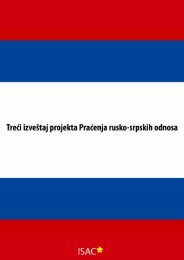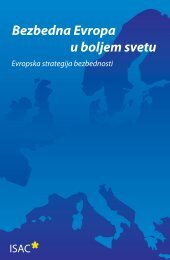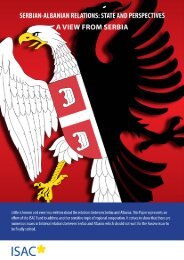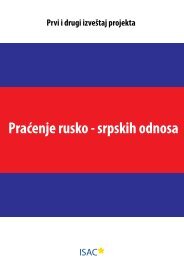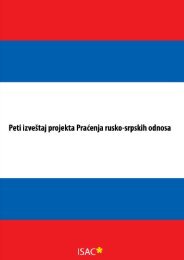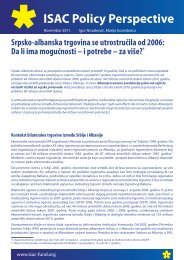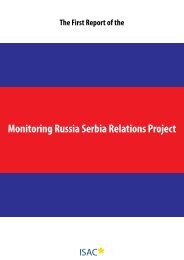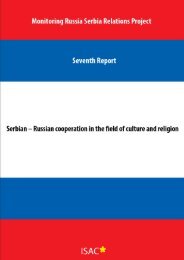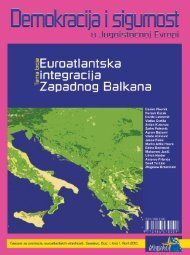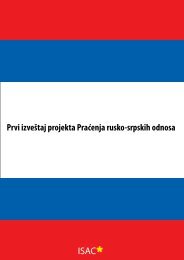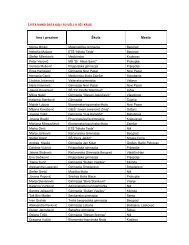MONITORING RUSSIA SERBIA RELATIONS - ISAC Fund
MONITORING RUSSIA SERBIA RELATIONS - ISAC Fund
MONITORING RUSSIA SERBIA RELATIONS - ISAC Fund
- No tags were found...
Create successful ePaper yourself
Turn your PDF publications into a flip-book with our unique Google optimized e-Paper software.
Russian Authorities: the Decision-Making System and the Social ContextMikhail Vinogradov 1In describing the political situation in Russia it is necessary to define six basic factors whichset out the conditions for making the most important political decisions.1. Most of the public political institutions (including the Parliament and politicalparties) do not play a serious role in the political life and merely approve decisionsmade by the President and the Head of the Government.2. The interaction between President Dmitry Medvedev and Prime MinisterVladimir Putin is at odds. In spite of good personal relationship, it is gettingincreasingly harder for Medvedev and Putin to eliminate emerging differences.3. The decision-making system is often defined by the correlation of powersbetween the leading influential groups, although most of them do not have clearpolitical views.4. The decision-making in international politics is concentrated in the hands ofthe President and the Prime Minister. The role of other institutions (including theMinistry of Foreign Affairs) is not significant. Decisions made are oftendetermined by the internal political situation.5. In spite of the economic crisis, the society still does not take keen interest inpolitics. Russian authorities effectively control the societal agenda by havingcontrol over the television networks and by hindering emergence of oppositionmovements.6. The role of political experts in the decision-making system has diminished.During the last few months there have been attempts to increase the role ofexperts, however, in general, like the Parliament and the political parties, thepolitical experts only approve or pass decisions made by the officials, and do notparticipate in the process of their creation and development.The Role of the Public InstitutionsThe significant reduction of the role of public political institutions, including the Parliamentand political parties, was the result of changes which took place during the period ofVladimir Putin’s presidency. The Parliament was, in effect, isolated from participation in thedecision-making process and was subordinated in its activity to the Administration of thePresident. As for the political parties, over the period of 8 years, Yedinaya Rossiya (the“United Russia”) gained dominant positions. Vladimir Putin is its formal leader and theParty won a majority at the federal and regional levels. However, Yedinaya Rossiya did notbecome an instrument of control of political elites and the center of the decision-making. Ineffect, while membership in the party makes it easier to be elected to parliaments of alllevels, it does not however impose any serious obligations with regard to any group.Two other parties – Spravedlivaya Rossiya (the “Fair Russia”) and Pravoye delo” (the“Right Cause”) are formally close to the authorities but they do not have the level ofinfluence which Yedinaya Rossiya has.1 Mikhail Vinogradov is the Director of the “St. Peterburg Policy <strong>Fund</strong>” from Moscow19



